Choosing the right dental implant post is crucial, as it significantly contributes to the safety and stability of dental implant procedures. Among the many available implant posts, the Straumann Swiss Implants are one of the most highly regarded brands by experts. What are the advantages of the Straumann Swiss Implant? Where can you find reputable clinics for Straumann Swiss Implant placement? Let’s explore this in the article below.
Origin of Straumann Swiss Implants
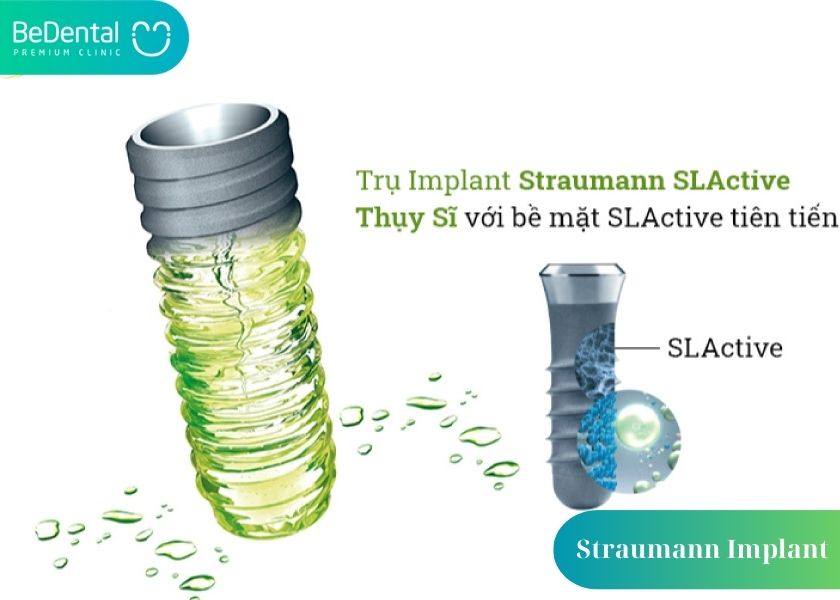
Straumann implants originate from Switzerland and are produced by the Straumann Group, a global leader in providing dental products and solutions. With over 60 years of development, Straumann has consistently offered innovative solutions to best support dental professionals. One of their standout products is the Straumann Swiss Implant, currently distributed in over 70 countries, with over 14 million units sold.
Straumann continues to improve their Straumann Implant line with the latest technologies, aiming to make it one of the highest quality implants in the world.
Structure of Straumann Swiss Implants
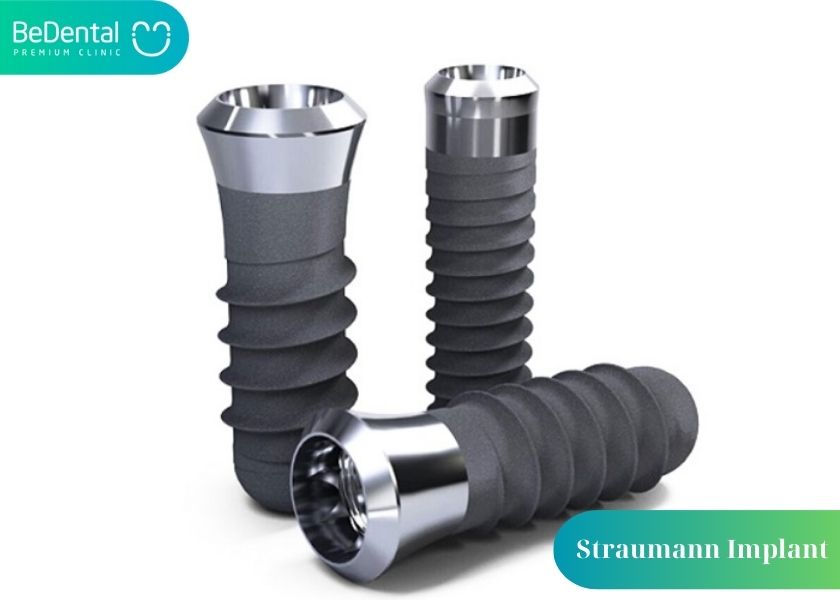
Straumann Swiss Implants are crafted from pure Titanium or Roxolid®, an alloy consisting of 15% Zirconium and 85% Titanium, specially designed for dental implants. The advantages of these materials include high durability and excellent integration with the jawbone, minimizing invasiveness.
Some popular Straumann Implant lines today include the Straumann SLA and Straumann SLActive. Each line has unique structural and characteristic differences.
- Straumann SLA Implant: Made from 100% Titanium, this is one of the earlier implants with a traditional design. Its surface is textured to facilitate easier integration with the jawbone. Despite not incorporating the latest technology, the SLA Implant is still highly regarded by experts and widely used in dental clinics.
- Straumann SLActive Implant: This is an upgraded version of the Straumann SLA Implant, incorporating SLActive technology. The implant surface is coated with a bioactive layer that enhances water activity and accelerates bone integration. The SLActive Implant design has also been updated to better suit jawbone structure, reducing bone integration time from 3-6 months to just 2 months, with healing occurring in as little as 3 days.
The SLActive Implant is often preferred in cases of full arch tooth loss, long-term tooth loss, or for patients seeking rapid tooth restoration.
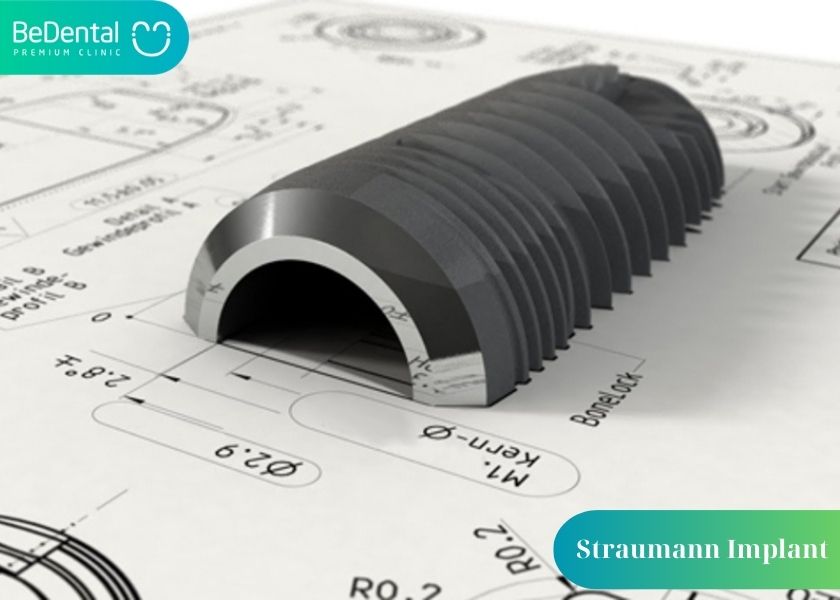
See more: Dentures are smelly and painful- Causes and some solutions
Advantages of the Straumann Swiss Implants
Straumann Swiss Implants have always impressed customers with their quality. Below are some key advantages of the Straumann Swiss Implant:
- Safety and Biocompatibility: The dental implant is made from Titanium, a material approved for use in the human body, ensuring safety and biocompatibility. Additionally, it is highly durable, providing a natural chewing experience similar to real teeth.
- Reduced Need for Bone Grafting and Sinus Lifts: Straumann Swiss Implants have a smaller size, making them ideal for cases with limited bone density or porous bone, thus reducing the need for additional procedures like bone grafting or sinus lifts.
- Quick Bone Integration and Healing: The SLActive surface technology accelerates bone integration and healing. The restoration period is shortened from 3-6 months to just 2 months, with healing occurring in 3-4 weeks.
- Suitable for Various Tooth Loss Cases: Straumann Swiss Implants are suitable for a wide range of cases, from single tooth loss to full arch restoration. They are often recommended for full arch implants, even in patients with compromised bone density.
- High Aesthetic Appeal: The slim design and tight fit of the dental implant and abutment provide excellent aesthetic results after tooth restoration.
- Time-Efficient Tooth Restoration: Often referred to as “water implants,” Straumann Swiss Implants represent a significant advancement in dental implant technology, allowing for quicker bone integration and reducing the overall time needed for tooth restoration.
- Easy and Effective One-Time Placement: The deep thread design of the Straumann Swiss Implant allows for easy, stable placement in a single procedure. The deep threads ensure strong adhesion and connection with the jawbone, increasing the success rate and effectiveness of the dental implant.
- Long-Lasting Durability: Straumann Swiss Implants are known for their high durability and long-term stability during chewing. Their lifespan can extend up to 20 years, or even a lifetime, with proper care—a fact long recognized by experts.
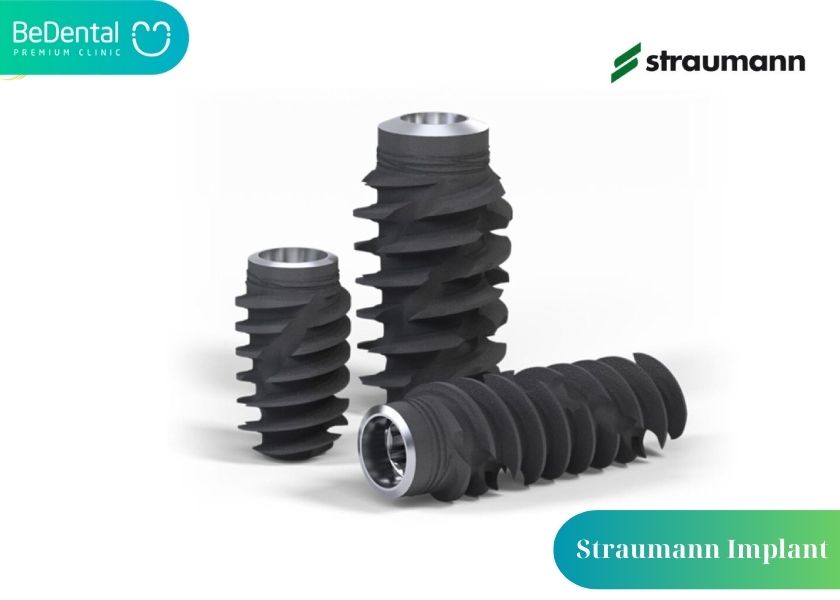
Comparison Between Straumann SLA and Straumann SLActive Implants
Knowing the pros and cons of these two implant lines can help individuals choose the most suitable dental implant for their needs.
Advantages:
- Straumann SLA Implant: The classic SLA surface creates a macro-textured surface on the Titanium, followed by micro-texturing through acid etching. This provides an ideal surface for bone attachment. Studies show that Straumann SLA Implants achieve a stability rate of 95.1% to 98.8% when placed in the jawbone, with minimal bone loss, averaging between 0.5-1mm, over 10 years.
- Straumann SLActive Implant: Enhanced from the classic Straumann Implant, the SLActive technology, with its bioactive coating, improves water activity and ensures high success rates. It integrates easily with the jawbone, making it effective even in long-term tooth loss cases. The chewing efficiency and integration success after 10 years reach 98.2%, with implantation time reduced to 3-4 weeks. Bone regeneration is also enhanced, minimizing bone loss, and the success rate of Straumann SLActive Implants reaches 100%.
Disadvantages: The main disadvantage of Straumann implants is their high cost compared to other dental implant types. Therefore, careful consideration of your needs and financial situation is advised before choosing this implant type.
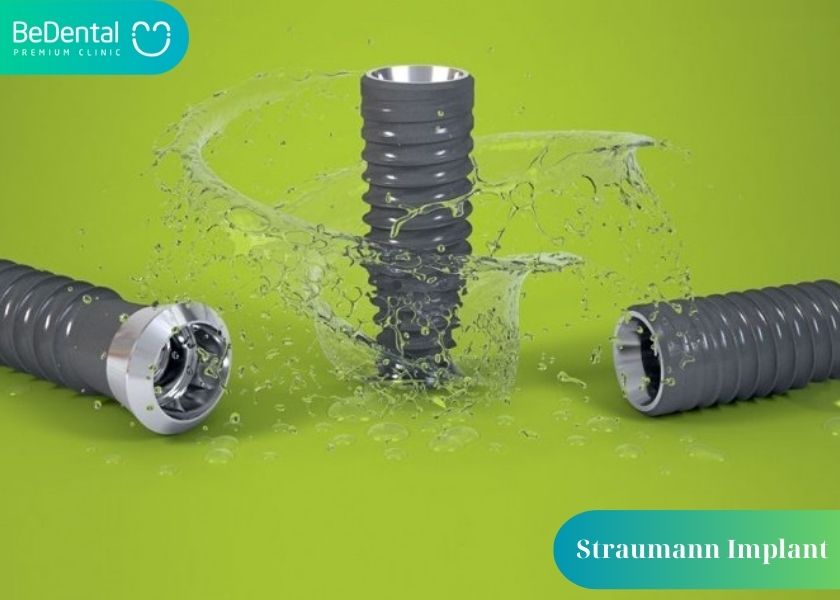
How Much Does a Straumann Swiss Implant Cost?
Straumann Swiss Implant Cost varies depending on the dental clinic and the quality of the implant chosen. At BeDental, the cost of a Straumann Swiss Implant, including the implant post, abutment, and titanium crown, is approximately 50,000,000 VND. If you prefer a different type of crown instead of a titanium one, additional costs will apply.
Depending on your oral health, additional treatments may be necessary to ensure the best oral health before implant placement. Therefore, the total cost may include additional treatment fees.
See more: Should be extracted molar tooth decay? Is it painful?
Reputable Clinics for Straumann Swiss Implant Placement
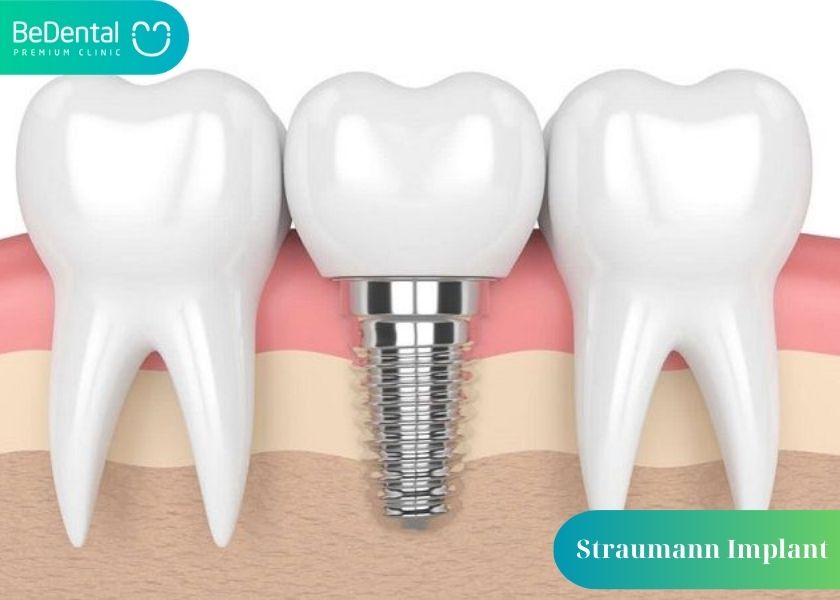
BeDental, established in 2012, has quickly become a leading provider of dental services and a pioneer in aesthetic dentistry. With a team of experienced doctors and state-of-the-art equipment, BeDental has made significant strides towards becoming a top aesthetic dental center in Vietnam. BeDental is known for its implant services, where each patient’s condition is thoroughly evaluated before deciding on the most suitable and affordable implant option.
The above article has helped you reveal everything about Straumann Swiss implants. Contact Bedental if you want advice on appropriate methods to have more precious information, we will provide free help 24/7.
- The advantage of this method is to restore chewing ability, high aesthetics, prevent complications of tooth loss, preserve maximum real teeth, long life, suitable for many cases of tooth loss.
- Disadvantages of this method are high cost, long implementation time and high technical requirements.
- The cost of dental implants is about 26,000,000 - 45,000,000 VND (single implant) and about 170,000,000 - 325,000,000 VND (full jaw implant).
- Restoration time ranges from 3 - 6 months.
- Requires a highly qualified Doctor: The dental implant process requires a high level of expertise from the doctor to ensure success and avoid unwanted risks.
- Long treatment time: The dental implant process can take a long time, requiring patience from the patient
- Relatively high cost: Dental implants are synonymous with high cost, which is an important factor to consider when choosing a method.
- Tooth longevity: Implant teeth may not have the same lifespan as natural teeth, usually after 5 - 20 years a new porcelain tooth is needed.
- Although there are certain limitations, this method is very effective when performing dental restorations. Dental Implants have the ability to completely restore shape and function like a real tooth
Tư vấn chuyên môn bài viết:
BÁC SĨ DƯƠNG THỊ THÙY NGA





